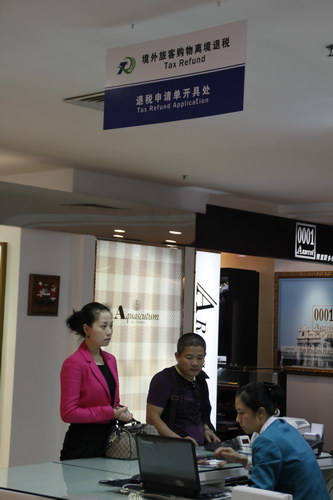Photos
Hainan tax rebate plan fails to lure the tourists
Updated: 2011-02-11 09:41
By Shi Yingying (China Daily)
 |
|
Travelers apply for a tax refund in Haikou, Hainan province. A total of 129 tax refund applications involving goods worth up to 465,300 yuan ($70,629) have been received by Haikou Customs since Jan 1. [Photo/China Daily] |
With mainlanders losing out from the tax-return policy, a total of 129 refund applications involving goods worth up to 465,300 yuan ($70,629) have been received by Haikou Customs since Jan 1.
The 11 percent rebate has been returned to eligible visitors purchasing more than 800 yuan's worth of goods at a total of 50,800 yuan.
Local media reported that the figure is less than expected.
"This showed that central government's strategy of boosting tourism consumption through preferential tax policies failed to attract the attention of tourists," according to a report in the Chinese Business News.
Effective from Jan 1, foreign travelers, and visitors from Taiwan, Hong Kong and Macao, can apply for a tax rebate of 11 percent of their total purchases when departing from the tropical island. However, the island's tax refund is limited to just three shopping malls in the cities of Sanya and Haikou at present.
"The shoppers' major concern is that tax will be returned only if they are departing from local airports on Hainan. Many of our foreign tourists transfer at airports in Guangzhou or Shanghai as they have more international flights," said Dou Jieming, a marketing assistant from Sanya's Summer Mall, one of the three that is eligible to sell tax-rebatable goods.
According to Dou, most of shoppers are visitors from Taiwan, Hong Kong and Macao rather than foreigners. "There were many inquiries from domestic shoppers, asking when they would be included in the policy," said Dou. "They complained about the 11 percent rebate being only for foreigners."
| ||||
"The policy has to be there as part of the basic infrastructure to attract more foreign tourists in the long run," he said. "Some people said a 50,000 yuan tax rebate is less than they expected, but it has been only one month since the policy came into force and, as the pilot, the publicity (to other cities) is important for us as well."
If that's the aim, Hainan has definitely caught Shanghai's attention.
According to Chen Yuxian, deputy head of the Industry Supervision Department of the Shanghai Municipal Commission of Commerce, the city is now working on a plan to give a tax rebate to foreign shoppers.
"Now that Beijing has given a green light to Hainan, we don't see why we can't get the nod too," Chen said.
E-paper

Ear We Go
China and the world set to embrace the merciful, peaceful year of rabbit
Preview of the coming issue
Carrefour finds the going tough in China
Maid to Order
Specials

Mysteries written in blood
Historical records and Caucasian features of locals suggest link with Roman Empire.

Winning Charm
Coastal Yantai banks on little things that matter to grow

New rules to hit property market
The State Council launched a new round of measures to rein in property prices.




